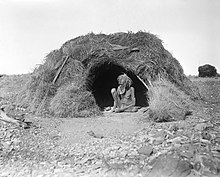 The Australian Aboriginal flag. Together with the Torres Strait Islander flag, it was proclaimed
a flag of Australia in 1995. | |
| Total population | |
|---|---|
| 984,000 (2021)[1] 3.8% of Australia's population | |
| Regions with significant populations | |
| 30.3% | |
| 5.5% | |
| 4.6% | |
| 3.9% | |
| 3.4% | |
| 2.5% | |
| 1.9% | |
| 0.9% | |
| Languages | |
| Several hundred Australian Aboriginal languages, many no longer spoken, Australian English, Australian Aboriginal English, Kriol | |
| Religion | |
| Majority Christian (mainly Anglican and Catholic),[2] minority no religious affiliation,[2] and small numbers of other religions, various local indigenous religions grounded in Australian Aboriginal mythology | |
| Related ethnic groups | |
| Torres Strait Islanders, Aboriginal Tasmanians, Papuans | |


Aboriginal Australians are the various Indigenous peoples of the Australian mainland and many of its islands, excluding the ethnically distinct people of the Torres Strait Islands.
Humans first migrated to Australia at least 65,000 years ago, and over time formed as many as 500 language-based groups.[3] In the past, Aboriginal people lived over large sections of the continental shelf. They were isolated on many of the smaller offshore islands and Tasmania when the land was inundated at the start of the Holocene inter-glacial period, about 11,700 years ago. Despite this, Aboriginal people maintained extensive networks within the continent and certain groups maintained relationships with Torres Strait Islanders and the Makassar people of modern-day Indonesia.
Aboriginal Australians have a wide variety of cultural practices and beliefs that some scientists believe make up the oldest continuous cultures in the world,[4] although this is disputed.[citation needed] At the time of European colonisation of Australia, the Aboriginal people consisted of complex cultural societies with more than 250 languages[5] and varying degrees of technology and settlements.[vague] Languages (or dialects) and language-associated groups of people are connected with stretches of territory known as "Country", with which they have a profound spiritual connection. Over the millennia, Aboriginal people developed complex trade networks, inter-cultural relationships, law and religions.[3][6]
Contemporary Aboriginal beliefs are a complex mixture, varying by region and individual across the continent.[7] They are shaped by traditional beliefs, the disruption of colonisation, religions brought to the continent by Europeans, and contemporary issues.[7][8][9] Traditional cultural beliefs are passed down and shared through dancing, stories, songlines, and art that collectively weave an ontology of modern daily life and ancient creation known as the Dreaming.
Studies of Aboriginal groups' genetic makeup are ongoing, but evidence suggests that they have genetic inheritance from ancient Asian but not more modern peoples. They share some similarities with Papuans, but have been isolated from Southeast Asia for a very long time. They have a broadly shared, complex genetic history, but only in the last 200 years were they defined by others as, and started to self-identify as, a single group. Aboriginal identity has changed over time and place, with family lineage, self-identification, and community acceptance all of varying importance.
In the 2021 census, Indigenous Australians comprised 3.8% of Australia's population.[1] Most Aboriginal people today speak English and live in cities. Some may use Aboriginal phrases and words in Australian Aboriginal English (which also has a tangible influence of Aboriginal languages in the phonology and grammatical structure). Many but not all also speak the various traditional languages of their clans and peoples. Aboriginal people, along with Torres Strait Islander people, have a number of severe health and economic deprivations in comparison with the wider Australian community.
- ^ a b "Estimates of Aboriginal and Torres Strait Islander Australians". Australian Bureau of Statistics. June 2023.
- ^ a b "4713.0 – Population Characteristics, Aboriginal and Torres Strait Islander Australians". Australian Bureau of Statistics. 4 May 2010.
- ^ a b Berndt, Ronald M.; Tonkinson, Robert (2023). "Traditional sociocultural patterns". Britannica. Chicago: Encyclopædia Britannica, Inc. Retrieved 19 July 2023.
- ^ Cite error: The named reference
Tonkinson-2011was invoked but never defined (see the help page). - ^ "Community, identity, wellbeing: The report of the Second National Indigenous Languages Survey". AIATSIS. 2014. Archived from the original on 24 April 2015. Retrieved 18 May 2015.
- ^ Berndt, Ronald M.; Tonkinson, Robert (2023). "Australian Aboriginal peoples". Britannica. Chicago: Encyclopædia Britannica, Inc. Retrieved 19 July 2023.
- ^ a b Cite error: The named reference
Cox-2016was invoked but never defined (see the help page). - ^ Cite error: The named reference
Harvey-2019was invoked but never defined (see the help page). - ^ Cite error: The named reference
Fraser-2012was invoked but never defined (see the help page).